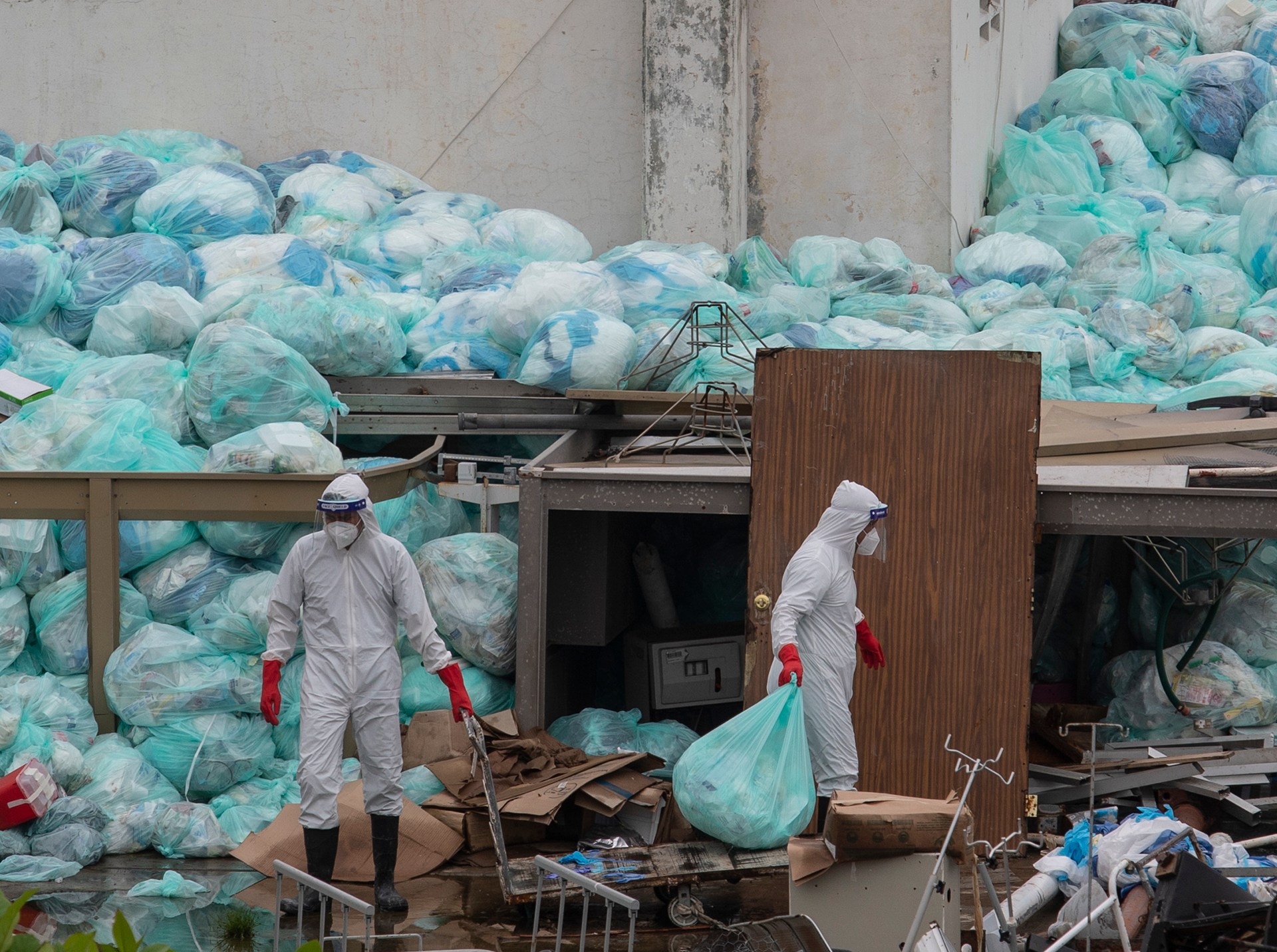The Value of Appropriate Waste Disposal Practices
From the effects of incorrect waste disposal on our atmosphere to the lasting implications for future generations, the significance of embracing sustainable waste management methods can not be overemphasized. By checking out the ecological influence of reckless waste disposal, the advantages of recycling initiatives, and the value of neighborhood involvement in waste reduction initiatives, a much deeper understanding of why proper waste disposal practices are crucial arises.
Environmental Effect of Improper Disposal
Inappropriate disposal of waste poses a considerable threat to the environment as a result of its detrimental effects on communities and human health and wellness. When waste is not effectively managed, it can cause pollution of the air, dirt, and water, creating injury to various plant and pet types. click here. Chemicals and toxins from improperly disposed waste can seep right into the ground, infecting groundwater sources and affecting the wellness of both wildlife and humans
Furthermore, the accumulation of waste in landfills generates greenhouse gases like methane, contributing to climate change and global warming. Inappropriate disposal methods additionally result in littering, which not only weakens the aesthetic worth of the environment but can likewise harm wild animals via intake or complexity.
To reduce these environmental influences, it is essential for individuals and areas to take on correct garbage disposal techniques such as recycling, composting, and responsible hazardous waste disposal. By taking these actions, we can help protect ecosystems, maintain all-natural sources, and guard human wellness for future and existing generations.
Advantages of Recycling Programs
Frequently joining reusing programs provides countless advantages for both the atmosphere and culture as a whole. Among the vital benefits of recycling is the preservation of natural sources. By recycling products such as paper, steel, glass, and plastic, less basic materials require to be extracted from the planet, resulting in minimized logging, mining, and boring tasks. This conservation of sources not just assists in maintaining eco-friendly balance but also contributes to lasting advancement.
Additionally, recycling plays an essential duty in minimizing energy usage and greenhouse gas emissions. The production of goods from recycled products usually calls for less power compared to manufacturing from virgin sources - medical waste removal. Therefore, the carbon footprint connected with the production process is substantially reduced, aiding in the fight against climate modification
Additionally, reusing programs develop task chances in the recycling sector, advertising economic growth and social welfare. By encouraging the recycling and reuse of materials, these programs support a circular economy that lessens waste generation and makes best use of source performance, eventually bring about a cleaner, greener future for generations to come.
Hazardous Waste Management Guidelines
Carrying out reliable contaminated materials administration guidelines is vital for decreasing environmental and health risks connected with the improper disposal of dangerous products - click here. Appropriate handling, treatment, and disposal of contaminated materials are important to prevent contamination of soil, water resources, and air
One secret standard appertains labeling of unsafe waste containers to make sure safe handling and transportation. In addition, facilities need to stick to strict storage space requirements to avoid leaks, spills, or mishaps that might endanger human wellness and the environment. Regular training programs for employees on contaminated materials administration methods are also essential to make certain conformity with guidelines and promote a culture of safety.
Additionally, unsafe waste ought to be set apart based on its homes to avoid chemical reactions that can result in dangerous scenarios. Executing a comprehensive waste radar can aid keep track of the movement of harmful materials from generation to disposal, making certain transparency and responsibility. By adhering to these standards faithfully, organizations and industries can add to a more secure and cleaner setting for existing and future generations.
Neighborhood Participation in Waste Reduction
To successfully attend to the ecological and wellness threats related to contaminated materials administration, involving the neighborhood in waste reduction initiatives is vital. Area participation plays a crucial duty in advertising sustainable waste management practices and fostering a society of environmental responsibility. By enlightening homeowners concerning appropriate waste segregation, reusing, and composting strategies, neighborhoods can dramatically decrease the amount of waste sent to garbage dumps, consequently decreasing environmental air pollution and saving all-natural resources.
Area involvement in waste reduction programs additionally assists in raising recognition about the importance of waste reduction and motivates individuals to take on eco-friendly habits in their every day lives - medical waste disposal. Joint initiatives in between neighborhood authorities, waste administration firms, and neighborhood participants can bring about the implementation of effective waste decrease techniques customized to the particular demands of each neighborhood or community
Additionally, community interaction fosters a feeling of ownership and liability amongst locals, empowering them to take positive steps in the direction of decreasing waste generation and promoting a cleaner, healthier environment for future and existing generations. By functioning together in the direction of usual waste reduction goals, communities can make a significant effect on alleviating the damaging results of improper waste disposal techniques.

Future of Sustainable Waste Practices
Conventional waste disposal methods, such as landfilling and incineration, are no longer sustainable in the long term due to their substantial ecological effects. Moving forward, the future of lasting waste practices lies in embracing a circular economic situation method, where resources are recycled, recycled, or repurposed to minimize waste generation.
Technological developments play a key function fit the future of sustainable waste methods. Advanced waste sorting and recycling technologies can help improve the efficiency of waste management processes, enabling for the healing of beneficial resources from waste streams. Additionally, the fostering of naturally degradable materials and composting approaches can assist lower the amount of organic waste winding up in garbage dumps, thereby mitigating greenhouse gas discharges.
Furthermore, promoting customer recognition and education and learning on appropriate waste partition and disposal methods is important for driving behavioral change in the direction of sustainability. By cultivating a society of waste decrease, recycling, and reuse, areas can collectively contribute to a cleaner and healthier atmosphere for future generations.

Conclusion
In conclusion, correct garbage disposal methods are essential for reducing environmental impact and advertising sustainability. By implementing recycling programs, handling contaminated materials appropriately, and motivating neighborhood involvement in waste reduction initiatives, we can function in the direction of a cleaner and much healthier setting. It is very important for governments, companies, and individuals to prioritize lasting waste methods for the future well-being of our planet.

From the effects of improper waste disposal on our setting to the lasting implications for future generations, the relevance of embracing sustainable waste management practices can not be overemphasized. By exploring the environmental effect of reckless waste disposal, the benefits of reusing initiatives, and the relevance of neighborhood interaction in waste reduction efforts, a much deeper view publisher site understanding of why appropriate waste disposal practices are essential emerges.
By informing residents regarding appropriate waste partition, reusing, and composting strategies, areas can substantially minimize the quantity of waste sent to land fills, thus reducing ecological air pollution and conserving natural resources. (click here)
Moving onward, the future of sustainable waste techniques lies in accepting a circular economic situation technique, where resources are recycled, reused, or repurposed to decrease waste generation.
Advanced waste sorting and reusing innovations can help boost the effectiveness of waste monitoring processes, allowing for the recovery of beneficial sources from waste streams.